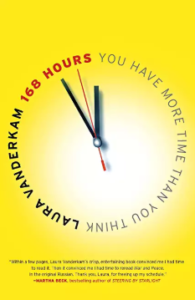
Warren Buffet does not keep a full calendar and other time-management tidbits
Warren Buffet told Charlie Rose and Bill Gates that sitting and thinking may be of much greater priority than filling every moment in your schedule. The clip, labeled Busy is the New Stupid, came across my feed with obvious interest. I don’t know if I agree with the stupid part, but busy is an idea that is far overused often, in my opinion, creating a victim mentality.
To have time is the most precious thing. Even WB can’t buy more. Most, including me, think more time would somehow alleviate some suffering and stress. There is a constant need to get things done and feelings of always falling short. Surely more time would help!
On the other hand, I am positive that our compulsive need to be overwhelmed would suffer with more time. It is little wonder I am seduced by time management books and work-life-balance programs.
Mindset determines how much time we think we have and often what we do with it. If you don’t think you have enough, you don’t! If you don’t enjoy what you are doing, time stands still. Be truthful. What would you do with more time? I would like to consider it.
There is a fascinating book called 168 Hours. One-hundred-sixty-eight is the number of hours in a week and, according to Laura Vanderkam, a week is about the amount of time for which proper planning could produce outcomes of productivity and success in life, work, health, and relationships. Is this the magic elixir? She contends, that we regularly think in terms of 24 hours—and most do that poorly. She also wants you to answer the question: what are you doing with the time you have? That is one of her very good questions that cut to the heart of my issues.

What we plan for on a daily/weekly basis (usually work first—or other tasks over which we have little control) does not make a priority of the things that make us happy: family time, exercise, hobbies, and self-care. She makes note that while planning like this may cause stress and resentment, it’s the habits that sustain our actions. Take control of this planning.
Keep a time log
Her argument that 168 hours is actually ENOUGH time is based on the fact that what you do matters to who you are. What you value is evident in where you spend your time. You may say you would like more time to exercise or play with the kids or even work but what other activity are you willing to give up for those things?
I think her time logs are magic. An exercise in who we are. I have a budget. I get it! I have also logged my work time in a performance evaluation—not fun. But very informative. Inventories, logs, and budgets can be a buzzkill, I have given you fair warning. But if you, like me, have that nagging productivity conundrum, you may benefit from the math a log can provide.
You will find exercising just five hours a week is less than 3% of your time. And on leisure, you may pick up some hours, or at least trade screen time. That’s the key. Make choices based on your goals and core competencies. I find it fascinating and a bit of a math problem. And you know I love that!
I have tried various ways to control my workflow, productivity, and schedules. Schools have their own pace and time constraints. This means we barter time to use the bathroom. Your system (yes, that one) must run like clockwork or you should expect an untimely accident (yes, you know the one).
This issue of time is a universal problem and is related, I expect, to the need to do more and the flip side of never doing enough. I’d love to get out from under that rock. I’m reminded, the universe abhors a vacuum. Even with my freedom from 9-5, I fill the same 168 hours, trading work for self-help books and writing when I’m not with my mother. Enjoying exercising and cooking without rush.
If I’m not seduced by these time management plans, I’m laughing at the many time-saving books and techniques being produced. Really! It is a huge shelf at the library. Google it. You will find the programs called, “A Teachers 40-hour Work Week” or “The 4-Day Work Week” or “Shave 3, 5, 10 hours off your work week.” Overworking may be a thing of the past for some corporate work-life balance lovers, but teachers don’t feel the freedom.
The Right Job
In Chapter 3, The Right Job, she asks another big question. If you were offered $400 million to never do the stuff of your work/field again, would you be bummed about it, despite your riches? Would you continue to do the work if you weren’t getting paid? The point is, if you love what you do, it wouldn’t seem like work and you will have more energy for the other parts of your life. There lies the shift in mindset. I think “work” might be considered, by many, to be the least favorite part of your 168 hours. Shame!
We all should find some meaning and purpose in our work. My dad worked as a farmer. He ran his own business, one might say. Actually, no one would have said that about single family farming, but today I know it was truly a business. A business he felt he controlled. Farmers work seven days a week, it’s true, but he set these hours. His time log may have looked very different than my work-a-weekday log. (I’m hearing Maggie Smith who played Dowager Countess in Downton Abbey asking with her British clip, “What is a week-end?”) But I never heard my Dad say, “I hate Mondays.” Never once heard him complain about the length of a week. And never did he admonish the week to be over. We do that because of dissatisfaction with our jobs—or mindset. My dad worked hard all his life and balanced that with long or short intermissions to play, dream, and create. He made these choices on how to use his time. He used it well.
I saw an article recently that asked if you, too, are dismissing most of the days of the week and living for the weekends. The article then posed a good question. Are you in the right job? There is much space between dream-job and being miserable. If we let the voice in our head drive the bus, you may find yourself parked in Miserable Land. There are memes galore advising you to “Hang on until the weekend” Or “Monday sucks.” Many of which dangle a cocktail as the thing to get us through or as a carrot at the end of the horrid workweek stick. (Let’s save that topic for another day.)
The point is, many days at school are filled with wonder and joy. Many opportunities to creatively solve problems that actually work. We are CEOs of our classrooms and from what I can see, many teachers are doing a miraculous job in their dynamic roles. They are challenged regularly with tasks that use their abilities well. Could we, perhaps, think differently about the “work” to save us from leaving a job we love.
Time, oh time. I love you and hate you. Check out 168 Hours by Laura Vanderkam. I know I will be coming back many times to the work-life-balance suggestions found here. Remember one the most

